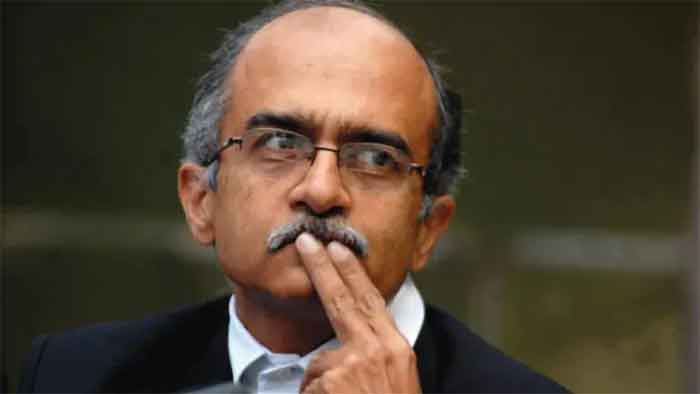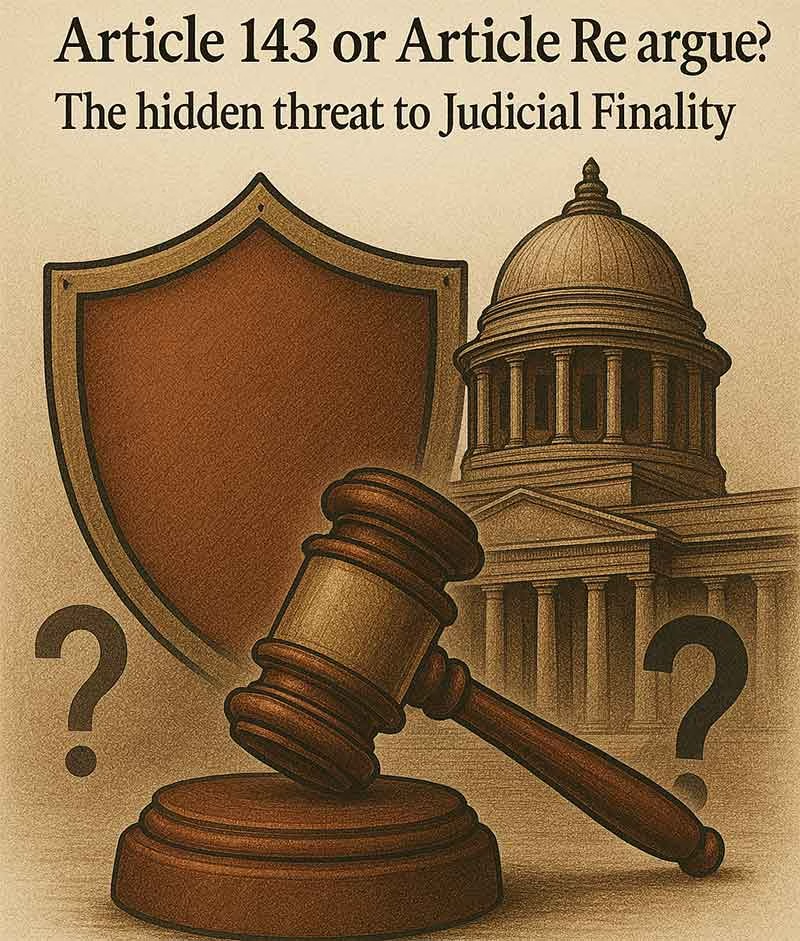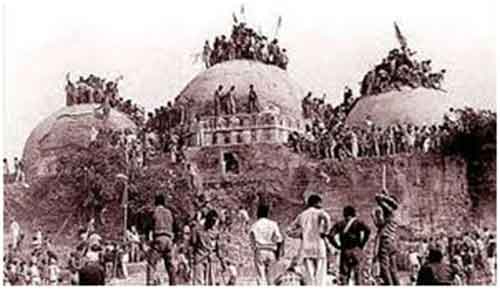
I venture to make this statement not in any way in extenuation of the penalty to be awarded against me, but to show that I have disregarded the order served upon me not for want of respect or lawful authority, but in obedience to the higher law of our being, the voice of conscience – Mohandas Karamchand Gandhi (Champaran Satyagraha Trials)
Respected Readers!!!!
Writing and Speaking something on the workings of Supreme Court can become a ‘Blasphemous Act’, so let me start this article with some genuine references. These are the references related to the criticism of Supreme court, which came out from its own institutional family members. The reason to place such references comes out of the belief that – it shall definitely provide my critical analysis ‘a refuge’ from the ‘iron hand manufacturers’. Manufactures, who are having the duties to dispense Justice. And are of the opinion that, Prashant Bhushan’s contempt of court ‘must be dealt with an iron hand’ for the sake of democracy.
So, let us start with the words of Justice Deepak Gupta, who became the first Supreme Court Judge to have a virtual retirement during COVID 19 Pandemic. In his farewell (6th May, 2020) speech, he stated that:
“You see, the country has great faith in the judiciary. I mean, we say it time and time again but at the same time, we cannot hide our heads like an ostrich and say that nothing is happening to the judiciary. We must identify our problems ourselves and deal with them. The integrity of the institution is something which cannot be put at stake under any circumstances,”
Now, let us move to another instance or anecdote, so that this write up does not become blasphemous (Emphasis added). On January 12th 2018, four senior Judges of Supreme Court – Justice Jasti Chelameswar, Ranjan Gogoi, Madan Lokur and Kurian Joseph held a press conference. Justice Chelameshwar took the lead and spoke:
“At the outset, we four would like to thank each one of you for responding on a very short notice. It is an extraordinary event in the history of this institution. The administration of the Supreme Court is not in order. Many things that are less than desirable have happened in the last few months, unless this institution is preserved, democracy will not survive in this country. It is extremely painful to hold the press conference in such a manner…. And all four of us are convinced that democracy is at stake and many things have happened in recent past”.
Any rational mind will firmly hold that – the above mentioned incidents do not lower down the status – quo or prestige of the Supreme Court. In fact, criticisms remain the crucial pillar for the positive development and that is why democracy develops and sustains upon a healthy opposition. But we live in strange times and as said by the Justice Arun Mishra, B.R. Gavai and Krishna Murari on the two critical tweets of Prashant Bhushan – ‘the strong arm of the law must strike a blow’. It was a clear from the comments made by the bench on Prashant Bhushan tweets that – it will not tolerate any criticisms. And when my lords realized that, the ‘motorcycle tweet’ was frivolous, they went ahead and dug the 11 years old contempt case against Bhushan with their own ‘iron hands’. Iqbal Chagla, who worked in the legal profession for over more than 55 years, opines on the same that:
“Bhushan’s comments had not lowered down the Court’s esteem or brought it into disrepute for 11 years, that it did not merit disposal during a pandemic when matters of far greater importance were pending, was not a consideration. The pending matters were, among others, challenges to Article 370, electoral bonds, the Citizen Amendment Act and, of course, habeas Corpus petitions and the fundamental rights of the people of Kashmir”.
Prashant Bhushan was held guilty of contempt on last Friday (14/08/2020), just a day before our independence day. And on 20th August his sentencing hearing was conducted. His hearing was live on Twitter and along with it hashtag HumDekhengey (we will see) was trending on social media platforms. The proceedings of the court not only became a national phenomenon, but also the moot point for the entire nation. It was a ‘Red Letter Day’ for the Supreme Court, as they were dealing with the soldier of Mahatma Gandhi – Prashant Bhushan; who just like Bapu listened to the voice of his conscience.
The order by Justice Arun Mishra-led Bench on Thursday said, “We have given time to the contemnor (Bhushan) to submit unconditional apology, if he so desires. Let it be filed by 24.08.2020. In case, apology is submitted, the case to be posted for consideration on the same, on 25.08.2020.” In response Prashant Bhushan refused of apologize and his statement became one of the finest statements of ‘Civil Disobedience’ of our times. The inspiration to do so, came from a frail lawyer who shook the foundations of British empire. The statement made by Prashant Bhushan was a reflection of Gandhi’s first civil disobedience movement on Indian soil i.e., Champaran Satyagraha. Bhushan went ahead and spoke:
“I find it hard to believe that the Court finds my tweet “has the effect of destabilizing the very foundation of this important pillar of Indian democracy”. I can only reiterate that these two tweets represented my bonafide beliefs, the expression of which must be permissible in any democracy. Indeed, public scrutiny is desirable for healthy functioning of judiciary itself. I believe that open criticism of any institution is necessary in a democracy, to safeguard the constitutional order…. My tweets were nothing but a small attempt to discharge what I considered to be my highest duty at this juncture in the history of our republic. I did not tweet in a fit of absence mindedness. It would be insincere and contemptuous on my part to offer an apology for the tweets that expressed what was and continues to be my bonafide belief. Therefore, I can only humbly paraphrase what the father of the nation Mahatma Gandhi had said in his trial: I do not ask for mercy. I do not appeal to magnanimity. I am here, therefore, to cheerfully submit to any penalty that can lawfully be inflicted upon me for what the Court has determined to be an offence, and what appears to me to be the highest duty of a citizen.”
The Bench of Justice Arun Mishra must have felt like or even if they did not, they represented the Magistrate and other officials, for whom Gandhi said that, on the day of Champaran hearing they were on ‘tenterhooks’. Another similitude of Champaran with the Bhushan’s hearing was represented by Attorney General K K Venugopal. Gandhi informs us that, the Government pleader was ‘pressing the Magistrate to postpone the case’. Interestingly, Venugopal who has been issued a notice to assist the court was not allowed to advance submissions before the bench. He spoke few words, but just like the government pleader of Champaran case – asked bench to not to punish Bhushan. The bench overpowered Venugopal, stopped him and said, ‘we cannot consider your proposal, unless he rethinks his statement’. Venugopal again tried to place his points by saying that, ‘he has the list of five Judges who has criticized the workings of Supreme Court’, but he was stopped again.
It was clear from the approach of Supreme Court Bench headed by Justice Arun Mishra on August 14th that – they want to flex their muscle and tone down any criticisms against them. But on 20th August they faced light of Bapu’s soul which came in the form of Bhushan’s reply. Now, the only way iron hand or apex court can save its strong aura Bhushan apology, but larger question remains will he? The proceedings and arguments suggest – he will not at any cost. If they do not sentence him, the message will be sent that – court was on a wrong side, by not accepting a healthy criticism. And if they sentence him, Bhushan will have the moral win and generations will study him as ‘conscience keeper of judiciary’. The legal and political fraternity have already started term this case as second ADM Jabalpur case.
In few days’ Supreme court will decide the faith of Prashant Bhushan’s case, but with the firmness of his voice of conscience, he has established himself as a true soldier of Mohandas Karamchand Gandhi. On August 20th he was guided by the ‘light’, for which Pandit Nehru stated that:
The light has gone out, I said, and yet I was wrong. For the light that shone in this country was no ordinary light. The light that has illumined this country for these many years will illumine this country for many more years, and a thousand years later, that light will be seen in this country and the world will see it and it will give solace to innumerable hearts. For that light represented something more than the immediate past, it represented the living, the eternal truths, reminding us of the right path, drawing us from error, taking this ancient country to freedom.
The light in Nehru’s word was the personification of Mahatma’s soul. Nehru gave this message to the entire nation after Bapu’s assassination. For Champaran Bapu said, ‘the country thus had its first direct object lesson in civil disobedience’; India awaits the same lesson in Prashant Bhushan’s Contempt’s case.
Dr Biplove Kumar, Assistant Professor, School of Law (SOL), Narsee Monjee Institute of Management Studies (Grade A University), NMIMS
SIGN UP FOR COUNTERCURRENTS DAILY NEWSLETTER















































